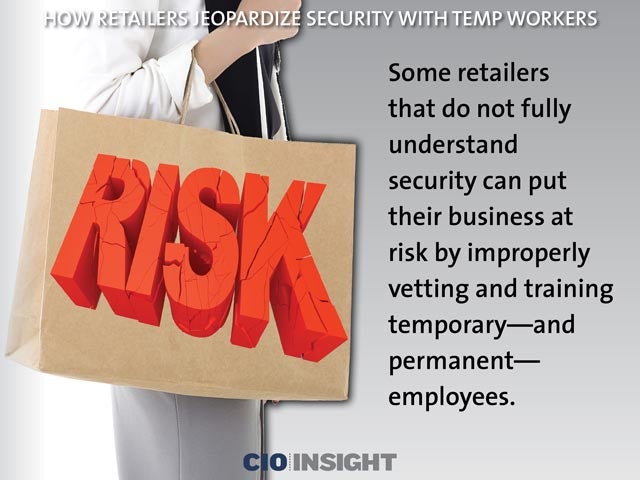
How Retailers Jeopardize Security With Temp Workers
 How Retailers Jeopardize Security With Temp Workers
How Retailers Jeopardize Security With Temp Workers
Some retailers that do not fully understand security can put their business at risk by improperly vetting and training temporary—and permanent—employees.
 Employees Share Log-in Credentials
Employees Share Log-in Credentials
Although respondents said they know what employees do when they access corporate systems and data assets, that is not so. 21% of permanent and 61% of temporary floor workers do not have unique log-in credentials for corporate systems.
 Shared Login Credentials Are Hazardous
Shared Login Credentials Are Hazardous
When employees share accounts, retailers have no visibility as to what each individual does when he or she accesses corporate systems and data assets.
 Temporary Employees’ Access to Systems Is Unknown
Temporary Employees’ Access to Systems Is Unknown
37% of respondents cannot identify which systems their temporary employees have accessed. 8% cannot say which systems permanent employees have accessed.
 Retailers Don’t Know if Sensitive Data Has Been Leaked
Retailers Don’t Know if Sensitive Data Has Been Leaked
26% of respondents don’t know whether temporary employees have ever accessed and/or send data they should not have accessed or sent.
 All Workers Create Risk
All Workers Create Risk
66% of respondents view permanent workers as somewhat risky.
 Temporary Workers Are Risky
Temporary Workers Are Risky
Survey respondents acknowledge that temporary workers are somewhat risky (47%) and fewer view them as high risk (32%).
 Retailers Have False Sense of Confidence
Retailers Have False Sense of Confidence
81% of retailers give themselves a rating of 6 or greater when it comes to identifying critical assets to protect, detecting theft or data leakage, and controlling employee access to critical assets.
 Security Awareness Training Is Inadequate
Security Awareness Training Is Inadequate
Seven in 10 IT decision-makers believe their retail organizations proactively provide security awareness training to employees. But 80% do so only once or twice a year.
 Factors Accounting for Employee Risk
Factors Accounting for Employee Risk
High turnover in retail industry: 5% change jobs monthly, translating into 60% annually. Holiday rush hiring results in minimal vetting. High turnover and rush to hire seasonal workers results in little employee education, especially regarding security.